On this episode of WPwatercooler, the panel discussed the evolution and future of WordPress themes with a spotlight on Gutenberg Block Design. Episode 300 began with light-hearted introductions and acknowledgment of the podcast’s milestone. The conversation quickly shifted to the Gutenberg block editor and its integration into WordPress. The difference between the codename ‘Gutenberg’ and the actual block editor was a major talking point. The team explored the naming conventions, confusion around the moniker, and its integration into other platforms like Drupal. The discussion led to how themes have evolved in WordPress and the challenges and opportunities that arise from the Gutenberg project. The panel addressed the importance of the database in WordPress and its implications for data portability. Concerns were raised about the current decision-making processes within WordPress, emphasizing the potential economic and societal impacts of its governance or lack thereof. Finally, the episode touched on the significance of security updates in the WordPress ecosystem. The session wrapped up with an invitation for listeners to subscribe to the WPwatercooler podcast.
Join us around the virtual WPwatercooler on an upcoming episode!
This episode brought to you by ServerPress makers of DesktopServer and WPSiteSync.
00:00 Introduction and Milestone
00:02 Episode 300 Celebration
00:56 Morton’s Introduction and Block Editor Talk
01:41 Amazon Giveaway and Community Interaction
02:33 Personal Introductions and Opinions
03:22 WPwatercooler Streaming Platforms
03:54 Naming Conundrum: Gutenberg vs. Block Editor
04:50 The Controversy of Gutenberg Naming
06:24 Gutenberg and Other Web Projects
07:20 User Perceptions of Gutenberg
08:28 Need for Consistency in Naming Conventions
09:06 Visual Landscape of Block Editor
09:41 Design Challenges with Blocks and Themes
10:43 Evolution of WordPress Themes
11:54 Future of Block Integration
12:31 Decision-making in WordPress Development
13:04 Open Source Contributions and Project Dynamics
14:20 Vision for WordPress as a Page Builder
15:17 Challenges with User Experience
16:33 The Role of Matt in WordPress Evolution
17:09 Importance of Database in WordPress
18:13 Content Storage and Governance in WordPress
19:15 The Broader Web and WordPress Governance
21:28 Organizing the WordPress Governance Project
24:19 WordPress as a Political Entity
26:41 The Economic Impact of WordPress Updates
27:31 Security Concerns in WordPress
29:40 Concluding Remarks and Subscription Call-to-Action









Leave a Reply